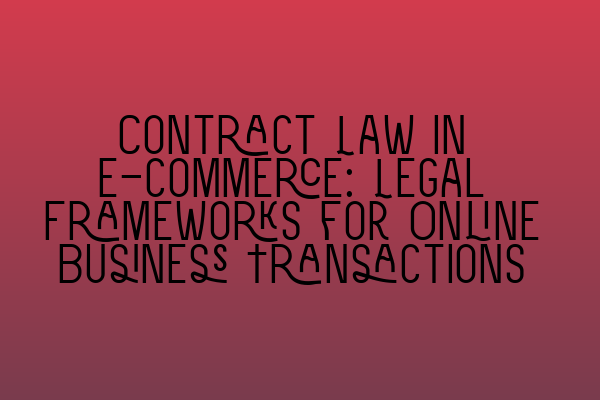Contract Law in E-commerce: Legal Frameworks for Online Business Transactions
In today’s digital age, e-commerce has become a prevalent method of conducting business. With the rise of online marketplaces and virtual storefronts, it is essential for businesses to understand the legal frameworks governing their online transactions. This blog post will explore the key aspects of contract law in e-commerce and provide valuable insights for businesses engaged in online business activities.
The Importance of Contracts in E-commerce
Contracts form the foundation of any business transaction, and e-commerce is no exception. A well-drafted contract helps establish the rights and obligations of the parties involved, provides a clear framework for dispute resolution, and ensures legal protection for both buyers and sellers.
When it comes to e-commerce, contracts serve several crucial purposes:
- Offer and Acceptance: A contract is formed when one party makes an offer and the other party accepts it. In an online setting, the offer is typically made when a customer adds items to their cart or clicks the “buy now” button. The acceptance occurs when the customer completes the checkout process.
- Product Descriptions and Terms: Contracts establish the terms and conditions of the transaction, including product descriptions, prices, shipping details, and return policies. Clear and accurate descriptions are essential to avoid misrepresentation and disputes.
- Payment and Delivery: Contracts specify the payment methods accepted, the timing of payment, and the delivery arrangements. These terms ensure both parties understand their roles and responsibilities in the transaction.
- Dispute Resolution: Contracts often include dispute resolution clauses, such as mediation or arbitration, to resolve potential conflicts outside of court. These clauses can help save time and costs if disputes arise.
With the ever-increasing volume of e-commerce transactions, it is crucial to ensure that contracts are properly drafted, enforceable, and compliant with relevant laws and regulations.
Compliance with Consumer Protection Laws
When engaging in e-commerce, businesses must comply with consumer protection laws to safeguard the interests of their customers. Consumer protection laws vary across jurisdictions, but they generally cover areas such as:
- Product warranties and guarantees
- Advertising and marketing practices
- Privacy and data protection
- Refund and return policies
Businesses should review the consumer protection laws applicable to their target markets and ensure their contracts and business practices are in compliance. Failure to comply with these laws can result in legal consequences, damage to the business’s reputation, and potential financial liabilities.
Electronic Signatures and Online Contract Formation
With the advancement of technology, the traditional notion of handwritten signatures has been replaced by electronic signatures. In e-commerce, electronic signatures are widely used to facilitate contract formation. Electronic signatures are valid and legally binding in most jurisdictions, provided certain criteria are met:
- Consent: The parties must actively agree to use electronic signatures.
- Intent: The parties must have the intention to authenticate the document.
- Reliability: The method used to create the electronic signature must be reliable and appropriate for the circumstances.
By adopting electronic signatures, businesses can streamline the contract formation process, reduce administrative burdens, and accelerate the speed of transactions.
Cross-border E-commerce and Jurisdictional Challenges
One of the unique challenges in e-commerce is the potentially global nature of online transactions. Cross-border e-commerce presents additional legal complexities, such as differing contract laws, taxation issues, and jurisdictional disputes.
When conducting cross-border e-commerce, it is essential to consider the following:
- Choice of Law: Businesses must determine which jurisdiction’s laws will govern the contract. If not explicitly stated, courts may apply different conflict of law rules to determine applicable law.
- Jurisdiction: In case of a dispute, businesses need to consider which courts have jurisdiction over the matter. Jurisdictional challenges can arise when dealing with customers from different countries.
- International Treaties: Some countries have entered into international agreements that can impact cross-border e-commerce, such as the United Nations Convention on Contracts for the International Sale of Goods (CISG).
Addressing these challenges requires a comprehensive understanding of international laws and a proactive approach to mitigating potential risks. Seeking legal advice from experienced solicitors who specialize in cross-border transactions can help businesses navigate through these complexities successfully.
Conclusion
As e-commerce continues to expand globally, understanding the legal frameworks surrounding online business transactions is crucial. Contracts play a vital role in establishing rights and obligations, ensuring compliance with consumer protection laws, and addressing jurisdictional challenges.
To navigate the complexities of contract law in e-commerce, it is advisable to seek guidance from legal professionals who specialize in intellectual property and e-commerce law. Visit Navigating Legal Challenges and Pitfalls in Your Practice to explore more about the legal aspects of running a law practice or Barrister vs. Solicitor: A Comprehensive Comparison to understand the differences between barristers and solicitors.
For businesses concentrating on specific legal niches, Exploring Different Solicitor Specializations: Finding Your Niche provides insights and guidance. Lastly, if you are interested in the growing trend of virtual law practices, check out Embracing the Rise of Virtual Law Practices to discover how technology is transforming the legal industry.
Remember, having a strong understanding of contract law in e-commerce is vital for any business seeking to succeed in the digital marketplace. Stay informed, updated, and consult legal experts to ensure compliance and protect your interests.
